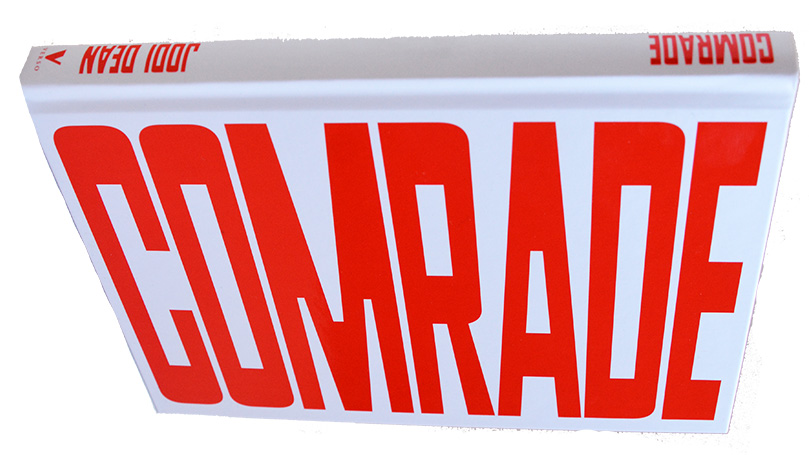
Comrade: An Essay on Political Belonging, by Jodie Dean, 2019. New York: Verso Books.
The centerpiece of this book is its chapter titled “Four Theses on the Comrade,” which works to define the characteristics of this explicitly communist political designation.
Fundamentally, Dean designates the term both as an expression of personal interrelations and an indication of one’s connection to the larger international revolutionary movement for communism. It indicates the equality and sameness, the lack of hierarchy among Party members; it distinguishes the member apart from and as more than the socially imparted identities or relations to exploitation and oppression. It places those who identify as such, with all of the historical privilege and baggage, rewards and wounds, and demerits of identity, on the same side of a struggle, “the real movement to abolish the present state of things,” as Marx put it.
Comrade is what she calls the “zero-level of communism.” It is the basic unit of the interpersonal that occurs in the act of facing together toward the political horizon to which we look to find ourselves in the collective struggle for human liberation from capitalist exploitation, white supremacist oppression, and colonial regimes of domination.
The “Four Theses” chapter draws on some histories of how some communist parties imagined and used this term to develop its arguments. (Notably, precious few experiences outside North America or Europe are represented in these historical sketches.) In so doing, Dean offers a philosophical grounding for a collectivist and committed revolutionary political subjectivity in both the neoliberal, capitalist present, and in a post-capitalist future. Besides, much of this slender book reads less like a philosophical treatise and more like a political tract on how communist militants, activists, cadre, staff, and everyday members might act within the party formation.
Dean has resisted and countered current suppositions that typically come from the left that the communist party form is no longer needed, or that it is little more than an institution that suppresses freedom or individuality. Her book Crowds and Party tackles that problem, and obviously with this book establishes a clear case for the Communist Party in the present. She doesn’t address any specific existing communist parties, except historically. She doesn’t tread into the mine-ridden territory of specific strategic policies or tactical styles of work the Party should pursue. She doesn’t address fragmentation or splintering or sectarianism in the political spectrum. This lack serves well the higher purpose of the book’s thesis.
Dean’s four theses are the following:
1. “Comrade” names a relation characterized by sameness, equality, and solidarity. For communists, this sameness, equality, and solidarity are utopian, cutting through the determinations of capitalist society.
2. Anyone but not everyone can be a comrade.
3. The individual (as the locus of identity) is the “Other” of comrade.
4. The relation between comrades is mediated by fidelity to a truth. Practices of comradeship materialize this fidelity, building its truth into the world.
In my mind, numbers 1 and 2 are self-evident and are well-developed in the book. Number 3 seems to be the most important of the four, the linchpin of the idea Dean is building.
Capitalist processes, logics, and ideologies work at the production of individuality. Capitalism valorizes complete isolation and division as somehow some form of freedom but, of course, leaves most of us alone and on our own in the struggle to survive. “Comrade,” Dean argues, works to undo that sadistic, violent, and alienating form of distorted existence. It binds us together in a collective struggle to build new types of freedom with equality, liberation from exploitation tied to identities.
Some of the discussion of identity in this book deserves more complex and dialectical treatment. One might be tempted to put this book down, believing that Dean is arguing for a politics of class above all else. I don’t think that is intended, but the binary relation of “identity” and “comrade” may produce that side effect.
More importantly, the way capitalist state and ideological apparatuses work to cause people and communities to live and act and be solely through the forms of legible identities is worth careful discussion. In her argument, “comrade” designates a means to hold all of these identities without succumbing to the imperatives of capitalist white supremacy or other forms of oppression.


 Join Now
Join Now